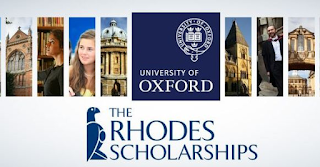 |
| The Rhodes Global Scholarships |
The University of Oxford is a collegiate research university in Oxford, England. As the evidence has proven about the teaching as early as 1096, this university is considered as one of the oldest university in the world. University of Oxford has educated many notable alumni, including 27 prime ministers of the United Kingdom and many heads of state and government around the world, 69 Nobel Prize winners, and 6 Turing Award winners.
The University of Oxford offers scholarships within the program of Rhodes Scholarships, which is also one of the oldest international graduate scholarship programmes. Rhodes The Studentships are awarded for pursuing full-time postgraduate studies at the University of Oxford, UK. Rhodes Scholars have been selected from many countries around the world annually. The scholarships are postgraduate awards supporting outstanding all-round students at the University of Oxford, and providing transformative opportunities for exceptional individuals.
Requirements
- Students of the following countries can apply for these Rhodes scholarships, and they are Australia, Bermuda, Canada, China, East Africa, Germany, Global Hong Kong, India, Israel, Jamaica, The Commonwealth Caribbean, Kenya, Malaysia, New Zealand, Pakistan, Saudi Arabia, Singapore, Southern Africa (including South Africa, Botswana, Lesotho, Malawi, Namibia and Swaziland), Syria, Jordan, Lebanon, Palestine, United Arab Emirates, United States, West Africa, Zambia and Zimbabwe. Citizenship & residency: You must meet the citizenship/residency requirements of one of the Rhodes constituencies – please refer to our full list of Rhodes constituencies and the countries they include. If you do not meet any of these requirements, then you can apply for our new Global Rhodes Scholarship.
- Age: You must have reached your 18th birthday and not have passed your 24th birthday on 1 October in the year of application. There is some variation on the upper age limit across constituencies depending on the local environment. Please check carefully the specific age requirements for your constituency before applying. Successful candidates will arrive in Oxford the October following the selection process. The Scholarship may not be deferred.
- Education: Rhodes Scholars must have completed a Bachelor’s degree before coming up to Oxford, to a sufficiently high standard to meet both the Rhodes and the Oxford criteria.
- English Language Requirements: English language: You must have a sufficiently high standard of English to meet the English language proficiency requirements (at the Higher Level listed) of the University of Oxford. The university only accepts certain standardized tests, thus please kindly check the required scores for every tests.
Ninety-five outstanding young males and females are awarded the Scholarship each year, from 20 Rhodes constituencies worldwide, and the awards include full tuition, a maintenance stipend, and flights to and from Oxford at the beginning and end of tenure.
Application Process
Applications for Rhodes Scholarships open during the spring and summer of the preceding year. All candidates for the grant should read the information about the awards applicable globally and then proceed to their country-specific page. The online application is not available for applicants to New Zealand. Please refer to the relevant country page: New Zealand. In broad terms, all constituencies will require the following materials in differing forms:
- Evidence of academic record/transcript (complete or in progress) of an undergraduate degree and any postgraduate study
- Curriculum vitae/resumé or list of principal activities
- Personal statement or essay (including, crucially, a clear statement of what the applicant wishes to study at Oxford and why)
- Evidence of age / birth certificate / passport
- English Language proficiency (where English is not the first language)
- Photograph
- List of referees (usually several are required) who can attest in confidential references to the character and intellect of the applicant, including academic, personal, extra-curricular and leadership achievements (and who should never include people to whom you are related)